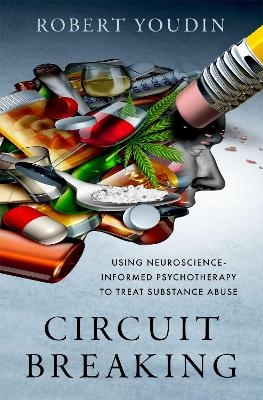
Circuit Breaking
Oxford University Press Inc (Verlag)
978-0-19-757502-4 (ISBN)
Circuit Breaking presents a paradigm shift from traditional forensic and medical treatments for psychoactive substance abuse. This new paradigm teaches therapists and students that a three-stage neurocircuitry of psychoactive substance abuse is the etiological cause of psychoactive substance abuse. Therapists learn how to teach people in treatment to change neurocircuitry within their brains enabling a sustained and successful recovery. This neuroscience-informed, non-disease-oriented treatment approach, inspired by evidence-based research, indicates that positive neuroplastic changes within one's brain and cognitive change within one's mind creates an opportunity for people to cease abusing psychoactive substances.
An example of improper and moralistic treatment for impoverished people and people of color occurs when jail or prison becomes their treatment. For middle and upper-class people, mental health practitioners ascribing to the medical model view them as having a disease that causes their abuse of psychoactive substances. These people are propagandized that they have a lifelong chronic illness needing episodic stays in rehab facilities, intensive outpatient treatment programs, detox facilities, and/or attendance in 12-step programs. Circuit Breaking provides a step-by-step guide on how to track daily frequencies of wanting (craving) to reveal activity of an underlying three-stage neurocircuitry of psychoactive substance abuse. By combining cognitive-behavioral interventions, mindfulness-based interventions, brief motivational interviewing techniques, and harm reduction interventions a therapist enables people to learn how to achieve a recovery process that culminates in being recovered. This occurs by extinguishing the underly neurocircuitry driving abuse of psychoactive substances. Using this integrative approach, therapists select techniques and interventions based on individual needs rather than a generic psychotherapeutic approach applied equally to all people being treated. Case vignettes throughout Circuit Breaking show the various ways different people experience neuroscience-informed psychotherapy and harm reduction interventions.
Robert Youdin, PhD is a Visiting Research Collaborator, Department of Molecular Biology, Princeton University and has a private psychotherapy practice specializing in substance abuse treatment.
PROLOGUE
PART I ROADS THAT PEOPLE TRAVEL THAT LEAD TO DIFFERENT TREATMENT APPROACHES FOR PSYCHOACTIVE SUBSTANCE ABUSE
Chapter 1 THE FORENSIC ROAD
Chapter 2 THE MEDICAL MODEL ROAD
Chapter 3 THE NEUROCIRCUITRY ROAD
Chapter 4 COMMONLY ABUSED PSYCHOACTIVE SUBSTANCES AND HOW THEY CREATE A NEUROCIRCUITRY OF PSYCHOACTIVE SUBSTANCE ABUSE
PART II PSYCHOTHERAPUETIC THEORIES, TECHNIQUES, AND HARM REDUCTION INTERVENTIONS
Chapter 5 TRACKING CIRCUITS
Chapter 6 REFRAMING COGNITIVE CONSTRUCTIONS
Chapter 7 BEING MINDFUL AND EXISTENTIAL
Chapter 8 COACHING
Chapter 9 SAFE ZONE
PART III FROM TREATMENT TO SUCCESSFUL RECOVERY
Chapter 10 MALIK'S JOURNEY FROM HEROIN TO NEUROSCIENCE-INFORMED PSYCHOTHERAPY
EPILOGUE
| Erscheinungsdatum | 01.11.2023 |
|---|---|
| Verlagsort | New York |
| Sprache | englisch |
| Maße | 163 x 226 mm |
| Gewicht | 454 g |
| Themenwelt | Geisteswissenschaften ► Psychologie |
| Medizin / Pharmazie ► Medizinische Fachgebiete ► Psychiatrie / Psychotherapie | |
| Medizin / Pharmazie ► Medizinische Fachgebiete ► Suchtkrankheiten | |
| Sozialwissenschaften ► Pädagogik ► Sozialpädagogik | |
| Sozialwissenschaften ► Soziologie | |
| ISBN-10 | 0-19-757502-1 / 0197575021 |
| ISBN-13 | 978-0-19-757502-4 / 9780197575024 |
| Zustand | Neuware |
| Haben Sie eine Frage zum Produkt? |
aus dem Bereich


